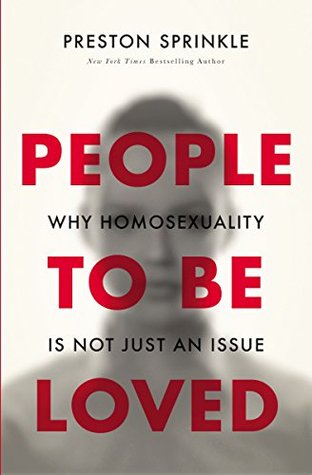More on this book
Community
Kindle Notes & Highlights
Read between
January 31 - February 20, 2019
But here’s the thing: most people who are attracted to the same sex don’t end up leaving the church because they were told that same-sex behavior is wrong. They leave because they were dehumanized, ridiculed, and treated like an “other.”
The question is whether two men or two women can date, fall in love, remain sexually pure before their wedding day, and commit to a life-long, consensual, Christ-centered, self-giving, monogamous union.
If the church is ever going to solve this issue, it needs to stop seeing it as an “issue.” Homosexuality is not an issue to be solved; it’s about people who need to love and be loved.
What would happen if Christians were known more by their radical, otherworldly love for gay people than their stance against gay sex?
To be clear: I’m using the word nonaffirming to describe those who don’t believe that the God sanctions same-sex sexual relations and the word affirming to describe those who believe that consensual, monogamous, same-sex sexual relations can be sanctioned by God.
Three things seem to be necessary for marriage according to Genesis 2: (1) both partners need to be human, (2) both partners come from different families (2:24), and—if I’m right about kenegdo—(3) both partners display sexual difference.
The Christian view of submission assumes equality, not hierarchy. That is, the one doing the submitting is not considered inferior.18 This is seen in other passages where Christ submits to the Father, which certainly doesn’t mean that Jesus is inferior to God the Father.
That’s because ancient Romans didn’t think in terms of sexual identity (gay or straight) but in terms of gender identity (manly or womanly).
In the fourth century BC, Aristotle said that some homoerotic desires come from habit, but others spring from nature.8 In other words, some people are born with same-sex desires.9 Another ancient writer argued that some men desire to play the passive role in same-sex intercourse because of a biological defect. His theory was absurd and medically invalid.10 But the point is, he believed that a particular form of same-sex erotic desire was biological and inborn.11
There are times, of course, when Jesus seems to correct the law. But if you look closely, you’ll see that Jesus isn’t usually correcting the law but a Pharisaic interpretation of the law.5
Jesus doesn’t lead with the law. He leads with love—love without footnotes.
Sure, Jesus was against paganism, violence, and many other habits in a centurion’s life. But he doesn’t feel the need to create a thick wall of moral conditions for the centurion to leap over in order to receive love. Jesus’ love comes without a background check.
It wasn’t because their behavior was affirmed. It was because their humanity was affirmed.
Our “stand” against homosexuality has been perceived as a stand not against sin but against humanity.
And it’s usually not because of the church’s nonaffirming view of same-sex behavior, but their nonaffirming posture toward gay and lesbian people. It’s not too much truth but too little love that’s driving gay and straight people away from the bride of Christ.
The love that seeks one’s holiness but isn’t contingent upon one’s holiness.
They keep hearing about some “good news” papered over with a thin veneer of grace, but it’s a gospel that lacks the scent of Calvary.
Loving people in spite of their behavior doesn’t mean affirming their behavior.
Scholars differ widely on what this word means since this is the first time it occurs in all of the ancient Greek literature we have.
In this sense, the seventh commandment against adultery was understood to encompass all forms of sexual immorality. And in Jewish tradition, homosexual intercourse was described as a form of adultery.
“That’s a good question, and I want to answer it. Can I buy you coffee every week for the next four weeks so that we can get to know each other first? I want to know your story, and I want you to know mine. And then we can talk about our question.”
But chances are, she would take him up on the offer and end up encountering the scandalous grace of God from the heart of a pastor who cared enough to listen to their story.
soft sense of simply describing an aspect of how they experience the world. For instance, I am a straight man. And both my straightness and maleness affect the way I see the world. In the same way, some of my friends are also men, but attracted to the same sex, which adds a very different lens through which they see and experience the world.
Second, I don’t think it is accurate to equate what people mean by same-sex orientation to what the Bible says about sexual desire. Same-sex orientation is a general disposition, regardless of whether someone is acting on it or even thinking about.
People have experienced change in identity, where they develop an improved sense of who they are.
But pain often accompanies holiness, and holiness unearths uncanny joy. Holiness is a difficult path for every Christian—gay or straight, married or single—and each path toward holiness comes with its own unique struggles.
The church doesn’t know what to do with singles.
Until the church can develop a better theology of singleness, it won’t know what to do with celibate gay people in their midst. And this is a real crisis.
It is hard to love someone while you are talking; love is most authentically shown when you are listening. To listen is to love, and you can’t love without listening.


